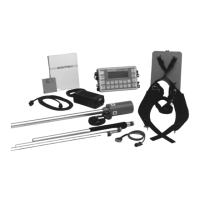Accurate and meaningful measurements
ENVI-MAG Manual A5-3
Operation
Other sources of noise
Other sources of noise can be objects (such as belt-buckles, branches, etc.)
striking the sensor, staff, or console while walking. These can introduce
microphonic noise that typically appears as spikes in your data. It is a good
practice to secure the sensor cable as much as possible to prevent this
microphonic noise.
On the staff
Detectability of anomalies depends on its magnetic moment, the size and the
distance from the sensor. The stop-and-go mode of operation, with the sensor on
top of four staff sections, is usually used for large low intensity anomalies.
Small anomalies are easiest detected using the search mode, with the staff held
upside down, with the sensor near the ground.
Note: The sensor has to be oriented for each reading.
On the back plate
The most convenient, hands free, configuration for surveying is a back-pack
mounting and is referred to as the WALKMAG mode. The sensor has to be
oriented once for a given area to suit the line direction. Since the sensor response
is symmetric, you do not have to worry about reversing the orientation as you go
up and down the survey lines.
Base-station
The Base-station is normally installed as close to the actual survey area as
practical to minimize spatial differences in the magnetic field.
The base-station sensor is supported by the staff and secured with the aid of three
cords and tent pegs, as shown in Figure A-37 ("Typical base-station sensor setup")
on page A5-4. In some situations, it may be more convenient to lash the sensor to
a tree. You can also use the standard total-field sensor (Figure A-3 on page A2-4)
instead of the base-station sensor (Figure A-4 on page A2-5) to operate in the
base-station mode, depending upon your particular circumstances.
Note: The long sensor cable is particularly susceptible to interference. You
should ensure that the sensor cable is kept away from other cables and
electrical equipment, especially electrical generators.

